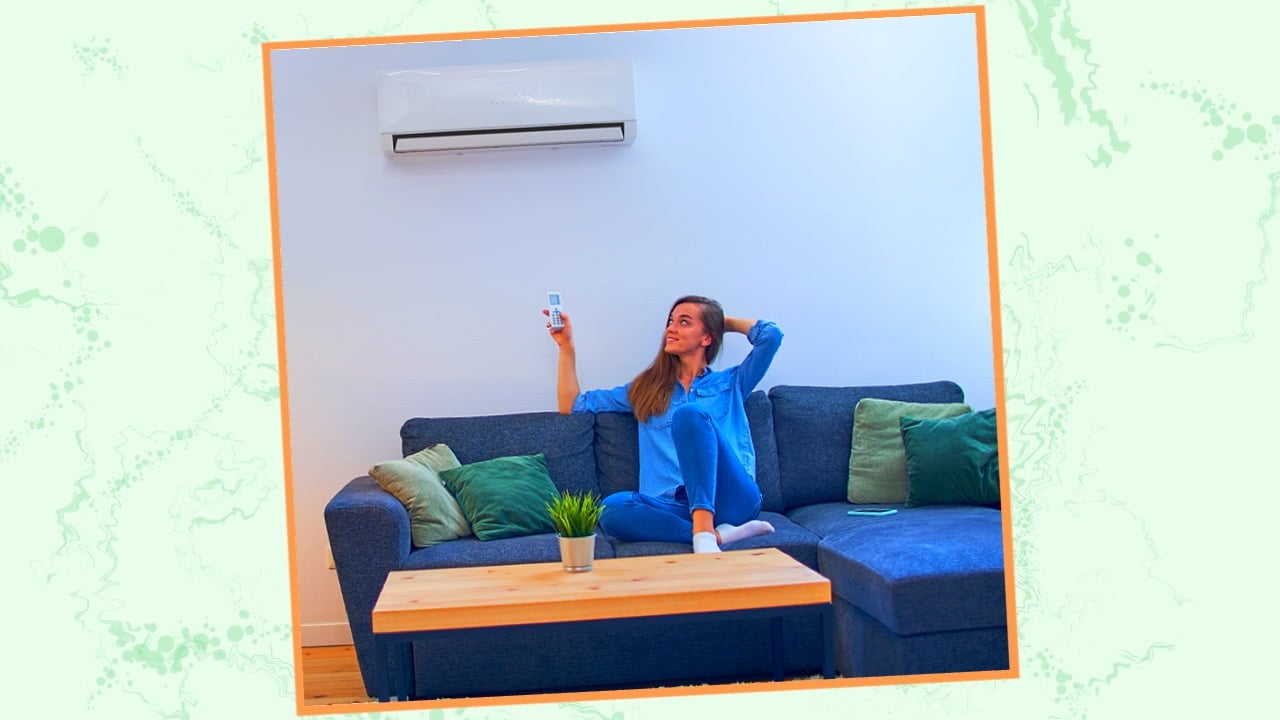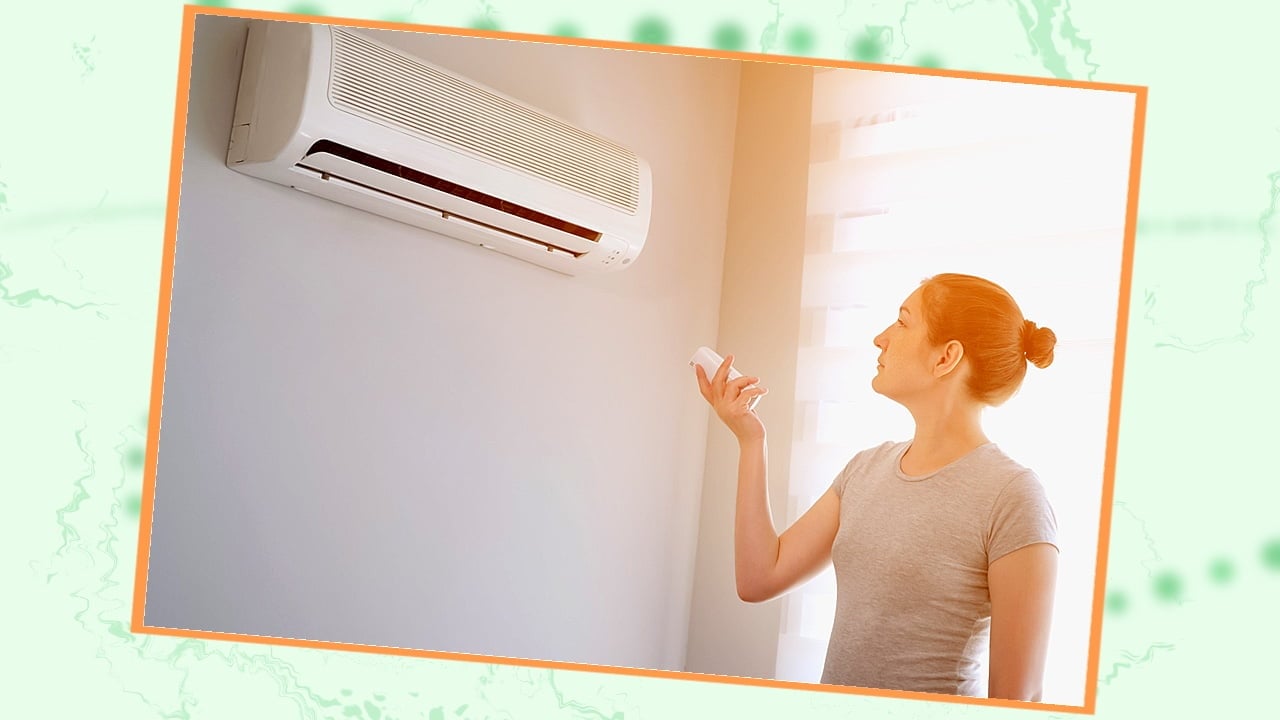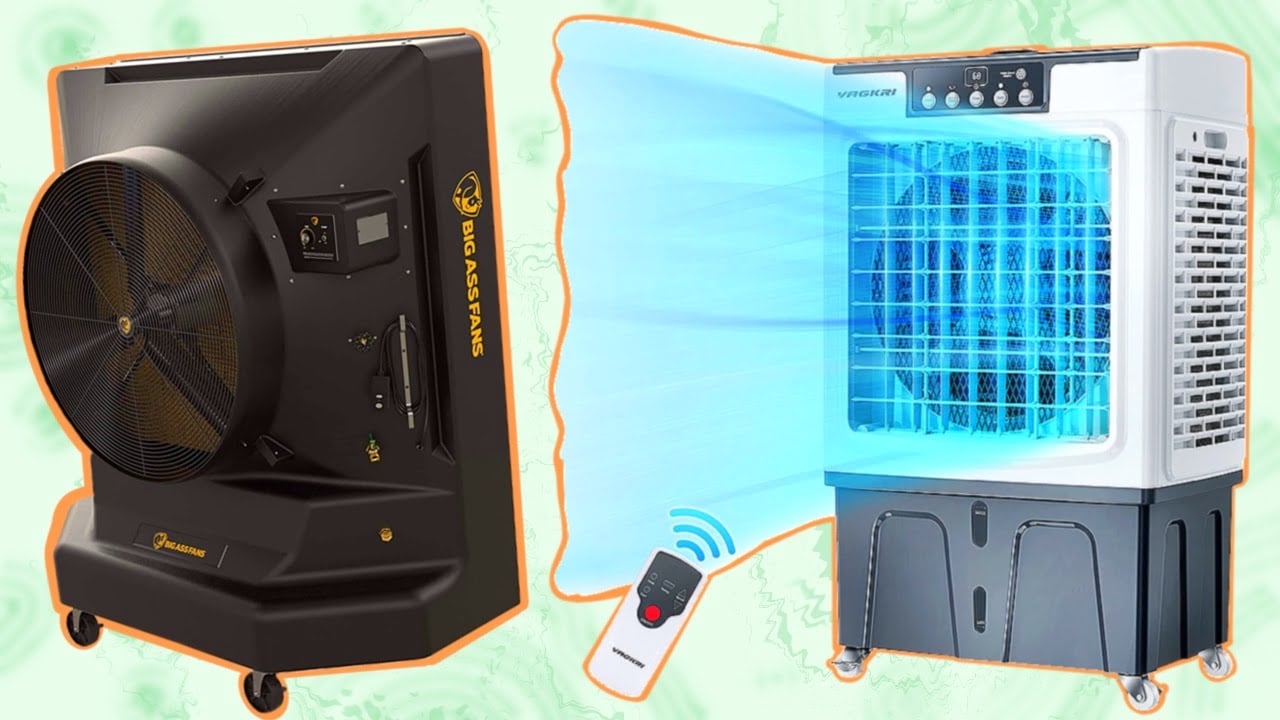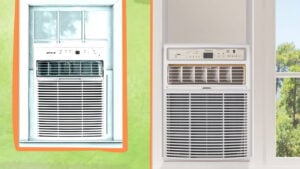Air conditioning systems are usable in arid and humid subtropical climates, whereas evaporative cooling systems do not work well in places with excess humidity. However, evaporative coolers are more affordable than air conditioners, owing to less energy-consumption and proving environment-friendly.

Excessively hot or cold spaces cause feelings of sluggishness or drowsiness. Hence, temperature regulation is a necessity; otherwise, it will take a toll on productivity and human health.
To beat the heat, air conditioners, and evaporative cooling systems are considered to be the most effective cooling solutions. But which one you should go for is a question that troubles many. Today, I’ll discuss the two systems in detail to help you decide.
Air Conditioning System: What Is It And How Does It Work?

A traditional air conditioner system is a unit that supplies cool air to an enclosed space while expelling warm air outside. All air conditioning units are equipped with refrigerant, a specialized chemical substance that facilitates this heat exchange.
The 3 main components of air conditioners are:
- Compressor
- Evaporator coil
- Condenser coil
While working in tandem, these 3 components turn the refrigerant into a liquid. The compressor increases the temperature and pressure of the chemical (refrigerant) before sending it to the condenser coil, where it’s converted into liquid.
This refrigerant enters the evaporator coil by flowing inside, where it evaporates and cools down the coil. Indoor air is circulated above the cold evaporator coil, and hot air in the space is absorbed by the refrigerant.
Consequently, the cooled air is released indoors, whereas the heated evaporated gas is returned to the compressor. As soon as the refrigerant gas is converted into liquid, heat is discharged into the outside air.
Until your space reaches the desired temperature, this cycle continues.
Different Types Of Air Conditioners
This age-old cooling system is available in various types and I’ve touched upon a few popular variants in this section.
1. Split System Air Conditioner
Among all the variants, a split system air conditioner is much sought-after because of its compact size. In spaces with small or no windows, this unit makes for an excellent option as it can be installed high on one of the walls.
Furthermore, it’s an energy-efficient unit, so you can stay cool without burning a hole in your pocket.
2. Reverse Cycle Air Conditioner
Usable all year round, reverse cycle air conditioners are heating, ventilation, and air conditioning systems which can supply hot and cold air to whichever space you install them in.
The multi-functionality of such units is what has contributed to its popularity among homeowners, especially those on a stringent budget. What’s even better is they do not consume much electricity, as they are energy efficient.
3. Wall Or Window Air Conditioner
Such air conditioning units are installed on the walls or windows and can cool up to 530 square feet of space efficiently. Compared to a split system air conditioner, they are ideal only for small spaces.
4. Portable Air Conditioner
Coming with a wheeled base and a free-standing body, portable air conditioners can be used to cool a small to medium-sized space. Unlike other air conditioners, they come with a hose to exhaust heat via a door or a window, which makes these air conditioning systems suitable for rented spaces.
Advantages Of Air Conditioning System
1. Improving Indoor Air Quality
Poor indoor air quality can lead to or aggravate respiratory issues and trigger an allergic reaction in people suffering from allergic rhinitis. Air conditioning systems trap pollutants from the air to improve air quality, reducing the detrimental effects of bacteria, allergens or airborne particles.
2. Reducing Humidity
Homes with high humidity are breeding grounds for mold and mildew.
Although dehumidifiers dehumidify a space well, they are expensive. Instead, an air conditioning system is a cost-effective solution to reduce moisture levels while staying cool and comfy.
3. Cycles Out Odors
Fumes and odors like chemicals are kept at bay by air conditioning systems. Air conditioners basically cycle out obnoxious smells so that you’re be surrounded by clean, healthy, and fresh air.

Air Conditioning Evaporative Cooling Systems: What Is It And How Does It Work?
Evaporative coolers, otherwise known as swamp coolers, cool air by moving hot outside air over cooling pads.
Where air conditioners rely on vapor compression or absorption refrigeration cycles, evaporative coolers rely on the principle of evaporation. At the base is a container where water is filled and transported to the cooling pads.
As soon as they are moistened, the fan blower absorbs heat or warm outside air, filters it, and moves it across the dampened pads. After this, the heated air is converted into cold air and distributed across the space via the vent or ducts to reduce the humidity of the space.
Types Of Evaporative Coolers
1. Direct Evaporative Cooler
Direct evaporative coolers deliver affordable temperature regulation by cooling the outside air and passing it over a moistened membrane. These portable evaporative coolers are low-maintenance and easy to set up. But even though such an evaporative system provides efficient cooling, they increase the humidity of the space.
2. Indirect Evaporative Cooler
An indirect evaporative air cooler cools a space efficiently by separating the cooled air from the warm and humid inside air. Such an evaporative cooler works by moving the air across a set of dampened pipes.
Experts recommend such evaporative cooling units for humid spaces because they don’t add to the humidity.
Advantages Of Evaporative Cooling System
1. Eco-Friendly
As evaporative cooling systems aren’t equipped with refrigerants and do not cause any damage to the environment.
2. Easy Maintenance
Another benefit of an evaporative cooler is that it’s easy to maintain and you won’t have to hire professionals to clean the unit.
3. Quiet Operation
Evaporative coolers are relatively quiet, meaning they don’t generate as much noise as other cooling solutions. That means you can enjoy sound sleep without disturbance.
Evaporative Cooling Vs Air Conditioning System: A Comparison
1. Performance
In terms of performance, air conditioning systems have better cooling capacity than an evaporative cooling system. The main reason is that the latter relies on hot outside air to cool a space, whereas the former is a refrigerant unit that operates independently.
That’s why air conditioners cool a room better than evaporative coolers. However, evaporative cooling systems function well in dry and hot climates, precisely in places where humidity levels are below 25%.
2. Energy Efficiency Or Efficient Energy Use
Evaporative cooling systems make use of a water pump and fan to supply cool air to a space, so they consume less energy. On the other hand, the compressor of the air conditioning system consumes a lot of power to maintain the temperature of the room.
So, it’s safe to say that evaporative coolers are energy-efficient, whereas air conditioners consume more energy.
3. Environmental Issues
Where air conditioners rely on toxic gasses to cool a room, evaporative coolers use only water and a fan to provide a cooling effect.
So, evaporative cooling systems minimize carbon dioxide emissions to a great extent. Unlike air conditioning systems, they don’t contribute to air pollution or greenhouse gas emissions. Despite the fact that modern-day refrigerants are safer than those used a few years ago, they are still chock-full of toxic chemicals.
Anyone who wishes to reduce their carbon footprint must go for evaporative coolers because they are environment-friendly.
4. Upfront Price
When compared, air conditioners are more expensive than evaporative coolers, and why not? They are highly efficient in cooling spaces of all sizes– small or large. Furthermore, air conditioning systems allow you to customize cooling as per your preferences.
You can set the temperature, adjust the fan speeds, switch to ‘sleep’ mode, set a programmable timer, and do a lot more. Conversely, evaporative cooling systems are considered the most economical cooling solutions because they are relatively inexpensive. But remember, you cannot customize the unit to your needs.
Yes, both popular cooling solutions improve indoor air quality, but air conditioners are best for people with allergies. That’s because evaporative coolers are open plan systems, meaning they work only when the doors and windows are open. Thus, pollen and particulate matter will blow in with the air. While you’ll have to clean an evaporative unit once every month, air conditioning systems require servicing once or twice every year. So, air conditioning systems are easy to maintain compared to evaporative coolers. Air Conditioning And Evaporative Cooling Related FAQs
Tip
Evaporative coolers generally work well in places with hot and dry climates, so people living in wet climates mustn’t use them. Another thing I’d like to bring to your attention is that evaporative coolers cool a room based on the humidity and ambient temperature.

Conclusion
Evaporative cooling vs. air conditioning system– which of the 2 cooling systems is the best?
To sum it up, air conditioning systems cool a space quickly and efficiently, filter indoor air, and cycle out odor, but they are slightly expensive. Meanwhile, evaporative coolers are easy to set up, are environment-friendly, and do not generate a lot of noise when running. But though affordable, they require frequent maintenance, and some units make the space more humid.
People who don’t mind spending more should go for air conditioners. In contrast, evaporative coolers would be the best bet for climate-conscious individuals or people looking for temporary cooling solutions.
